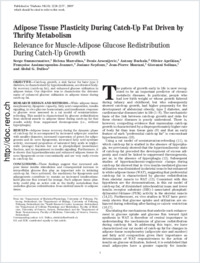Adipose tissue plasticity during catch-up fat driven by thrifty metabolism: relevance for muscle-adipose glucose redistribution during catch-up growth
- Summermatter, Serge Department of Medicine/Physiology, University of Fribourg, Switzerland
- Marcelino, Helena Department of Medicine/Physiology, University of Fribourg, Switzerland
- Arsenijevic, Denis Department of Medicine/Physiology, University of Fribourg, Switzerland
- Buchala, Antony J. Department of Biology, University of Fribourg, Switzerland
- Aprikian, Olivier Nestlé Research Center, Lausanne, Switzerland
- Assimacopoulos-Jeannet, Françoise Department of Cellular Physiology and Metabolism, Faculty of Medicine, University of Geneva, Switzerland
- Seydoux, Josiane Department of Basic Neurosciences, Faculty of Medicine, University of Geneva, Switzerland
- Montani, Jean-Pierre Department of Medicine/Physiology, University of Fribourg, Switzerland
- Solinas, Giovanni Department of Medicine/Physiology, University of Fribourg, Switzerland
- Dulloo, Abdul G. Department of Medicine/Physiology, University of Fribourg, Switzerland
-
14.07.2009
Published in:
- Diabetes. - 2009, vol. 58, no. 10, p. 2228-2237
English
OBJECTIVE: Catch-up growth, a risk factor for later type 2 diabetes, is characterized by hyperinsulinemia, accelerated body-fat recovery (catch-up fat), and enhanced glucose utilization in adipose tissue. Our objective was to characterize the determinants of enhanced glucose utilization in adipose tissue during catch-up fat. RESEARCH DESIGN AND METHODS: White adipose tissue morphometry, lipogenic capacity, fatty acid composition, insulin signaling, in vivo glucose homeostasis, and insulinemic response to glucose were assessed in a rat model of semistarvation-refeeding. This model is characterized by glucose redistribution from skeletal muscle to adipose tissue during catch-up fat that results solely from suppressed thermogenesis (i.e., without hyperphagia). RESULTS: Adipose tissue recovery during the dynamic phase of catch-up fat is accompanied by increased adipocyte number with smaller diameter, increased expression of genes for adipogenesis and de novo lipogenesis, increased fatty acid synthase activity, increased proportion of saturated fatty acids in triglyceride (storage) fraction but not in phospholipid (membrane) fraction, and no impairment in insulin signaling. Furthermore, it is shown that hyperinsulinemia and enhanced adipose tissue de novo lipogenesis occur concomitantly and are very early events in catch-up fat. CONCLUSIONS: These findings suggest that increased adipose tissue insulin stimulation and consequential increase in intracellular glucose flux play an important role in initiating catch-up fat. Once activated, the machinery for lipogenesis and adipogenesis contribute to sustain an increased insulin-stimulated glucose flux toward fat storage. Such adipose tissue plasticity could play an active role in the thrifty metabolism that underlies glucose redistribution from skeletal muscle to adipose tissue.
- Faculty
- Faculté des sciences et de médecine
- Department
- Département de Médecine, Département de Biologie
- Language
-
- English
- Classification
- Biological sciences
- License
-
License undefined
- Identifiers
-
- RERO DOC 13186
- DOI 10.2337/db08-1793
- Persistent URL
- https://folia.unifr.ch/unifr/documents/301383
Statistics
Document views: 136
File downloads:
- pdf: 165
